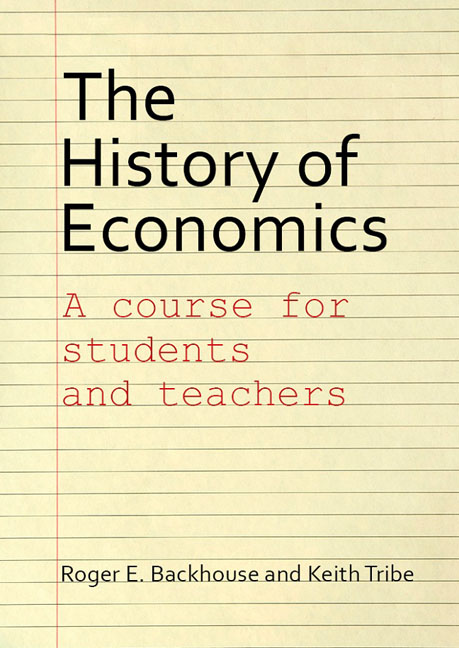Book contents
- Frontmatter
- Contents
- Introduction
- Lecture 1 Commerce, Wealth and Power: The Disputed Foundations of the Strength of a Nation
- Lecture 2 Natural Order, Physiocracy and Reform
- Lecture 3 Adam Smith I: Outline of a Project
- Lecture 4 Adam Smith II: The Two Texts
- Lecture 5 The Political Economy of Malthus and Ricardo
- Lecture 6 Political Economy in Continental Europe and the United States
- Lecture 7 Political Economy, Philosophic Radicalism and John Stuart Mill
- Lecture 8 Popular Political Economy: List, Carey, Bastiat and George
- Lecture 9 Radical Political Economy: Marx and His Sources
- Lecture 10 Marginalism and Subjectivism: Jevons and Edgeworth
- Lecture 11 From Political Economy to Economics
- Lecture 12 Alfred Marshall’s Project
- Lecture 13 Markets and Welfare after Marshall
- Lecture 14 Monetary Economics
- Lecture 15 The Rise of Mathematical Economics
- Lecture 16 Robbins’s Essay and the Definition of Economics
- Lecture 17 John Maynard Keynes
- Lecture 18 Quantitative Economics
- Lecture 19 The Keynesian Revolution
- Lecture 20 Modern Macroeconomics
- Lecture 21 Inflation and the Phillips Curve
- Lecture 22 Popular Economics
- Lecture 23 Economics and Policy
- Lecture 24 Ideology and Place
- Index
Lecture 10 - Marginalism and Subjectivism: Jevons and Edgeworth
Published online by Cambridge University Press: 09 August 2023
- Frontmatter
- Contents
- Introduction
- Lecture 1 Commerce, Wealth and Power: The Disputed Foundations of the Strength of a Nation
- Lecture 2 Natural Order, Physiocracy and Reform
- Lecture 3 Adam Smith I: Outline of a Project
- Lecture 4 Adam Smith II: The Two Texts
- Lecture 5 The Political Economy of Malthus and Ricardo
- Lecture 6 Political Economy in Continental Europe and the United States
- Lecture 7 Political Economy, Philosophic Radicalism and John Stuart Mill
- Lecture 8 Popular Political Economy: List, Carey, Bastiat and George
- Lecture 9 Radical Political Economy: Marx and His Sources
- Lecture 10 Marginalism and Subjectivism: Jevons and Edgeworth
- Lecture 11 From Political Economy to Economics
- Lecture 12 Alfred Marshall’s Project
- Lecture 13 Markets and Welfare after Marshall
- Lecture 14 Monetary Economics
- Lecture 15 The Rise of Mathematical Economics
- Lecture 16 Robbins’s Essay and the Definition of Economics
- Lecture 17 John Maynard Keynes
- Lecture 18 Quantitative Economics
- Lecture 19 The Keynesian Revolution
- Lecture 20 Modern Macroeconomics
- Lecture 21 Inflation and the Phillips Curve
- Lecture 22 Popular Economics
- Lecture 23 Economics and Policy
- Lecture 24 Ideology and Place
- Index
Summary
Aims of the lecture
1. To argue that the publication in 1861 of Mill’s critique of Bentham provided a platform for Jevons’s “mathematical political economy” of 1862, extending the argument made in lecture 7 regarding the importance of J. S. Mill’s Principles of Political Economy (1848) for the political economy of the later nineteenth century in Britain.
2. To suggest that during the mid-nineteenth century, English political economy followed a separate but broadly parallel path to German and French political economy, ending up in the 1880s in roughly the same place: a new subjectivist economics.
3. To demonstrate that Edgeworth first developed his understanding of the calculus of economic action from the exposition of the hedonistic calculus in Sidgwick’s Methods of Ethics (1874), and then subsequently learned his economics from Jevons.
Bibliography
Commentary upon the development of political economy in Britain during the last third of the nineteenth century has tended to focus on the work of Alfred Marshall in Cambridge, both during the 1870s and then after he returned there in 1885. As will be suggested below, this has tended to overshadow both the importance of Jevonian economics in Britain during the 1880s and the broader international significance of Edgeworth’s work in the twentieth century.
For Edgeworth, there is one central text that brings together his major writings with a useful introduction and a complete bibliography: Peter Newman (ed.), F. Y. Edgeworth’s Mathematical Psychics and Further Papers on Political Economy (Oxford: Oxford University Press, 2003). The Royal Economic Society gathered many of Edgeworth’s papers into a three-volume collection that remains widely available: Papers Relating to Political Economy (London: Macmillan, 1925). A further useful consideration of Edgeworth’s work is Stephen Stigler, “Francis Ysidro Edgeworth, Statistician”, Journal of the Royal Statistical Society A 141 (1978), 287–322.
Stanley Jevons was a polymath whose writings on political economy were only one part of his interests, albeit an important part. The best place to start is R. D. Collison Black’s entry for Jevons in the Oxford Dictionary of National Biography. Collison Black also edited Jevons’s Papers and Correspondence, 7 volumes (London: Macmillan, 1972–81).
- Type
- Chapter
- Information
- The History of EconomicsA Course for Students and Teachers, pp. 153 - 168Publisher: Agenda PublishingPrint publication year: 2017



